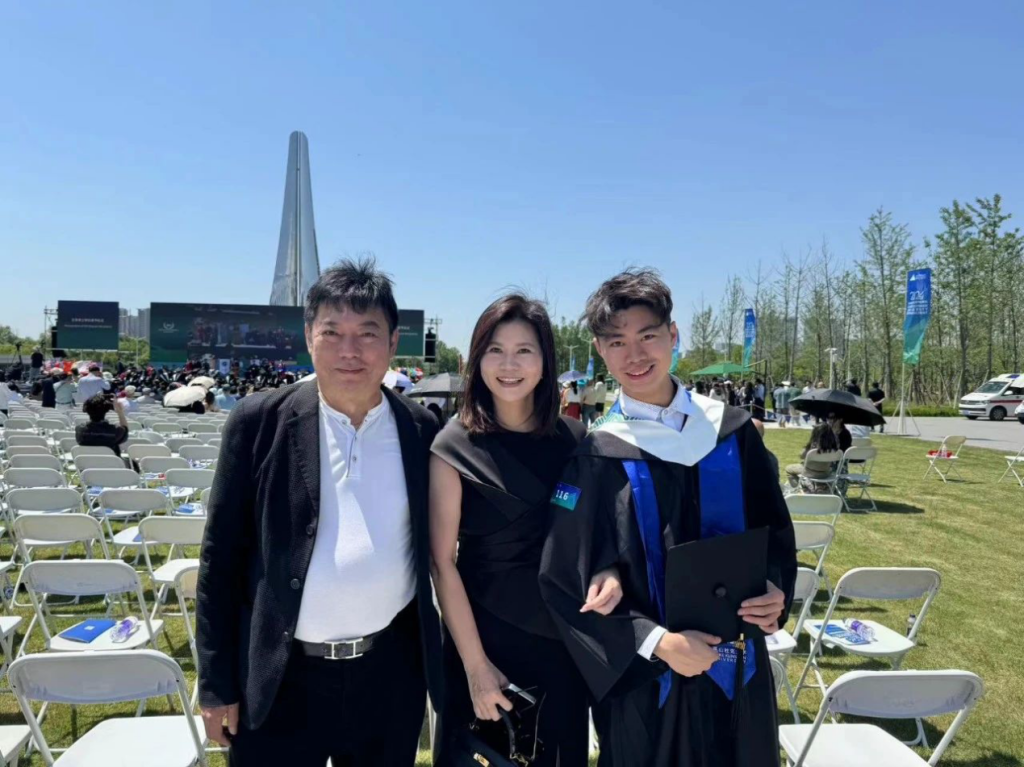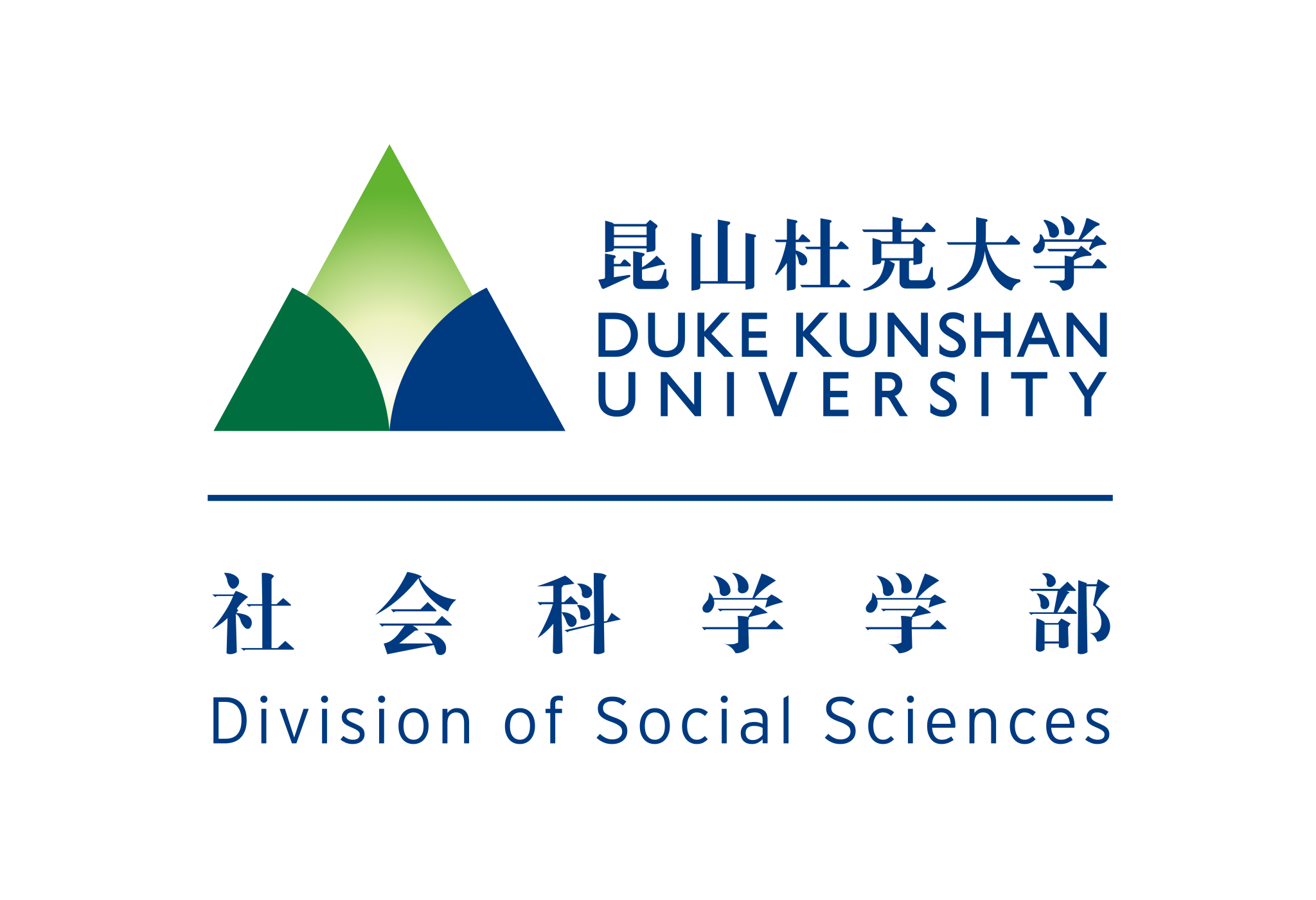
01 Why DKU?
Choosing Duke Kunshan University was actually a decision made by chance. I still remember that an admissions officer from DKU came to my high school and gave a speech at the College Fair. As a confused high school student at the time, I was full of doubts about the future. However, the admissions officer’s words touched me. He said, “The school is very willing to invest in students. In fact, the tuition you pay is far less than what we invest in you. Of course, the school is not a charity. The purpose of doing this is to invest in your future, because we believe that every student selected by the school will succeed in the future and give back to their alma mater.” After hearing this, I was touched by DKU’s educational philosophy and believed that DKU is a university that is willing to support and value the growth and future development of students, so I chose to come here. Looking back now, my heart is full of gratitude.

Photo with family in graduation celebration
02 Plans After Graduation
After graduation, I plan to pursue a Master of Science degree in Population Health Disease Prevention at Stanford University. This program features field research and emphasizes student participation in cutting-edge disease prevention research, aiming to train students’ scientific research and innovative resilience. This training will lay a solid foundation for me in the face of increasingly complex and unpredictable epidemic prevention challenges. In addition, the program integrates methods from sociology and data science and is committed to addressing health inequalities more accurately and efficiently. I believe that through such interdisciplinary learning and practice, I will be well prepared for future research and practice and make meaningful contributions to global health.
03 Significant Research Practice
During time at Duke, I embarked on a global health research journey as part of “Bass Connections” research project, which focused on alcohol use behavioral phenotyping in global populations. During this project, I witnessed firsthand the severe impact of alcohol addiction on the mental health and family life of patients in Tanzania and Brazil. Due to the limitations of the Diagnostic and Statistical Manual of Mental Disorders, Fifth Edition (DSM-5) approach, I combined my understanding of Research Domain Criteria (RDOC) and mental health procedures to work with the school’s computer science team to develop a novel assessment tool, the Alcohol Use Behavioral Phenotyping Test (AUBPT). This is a computer-based, cross-cultural assessment tool designed to predict the risk of alcohol use disorders in low- and middle-income countries. Our model, combined with a homemade game application, has been used in Tanzania (Kilimanjaro Christian Medical Centre) and Brazil Universidade de São Paulo.
Back at DKU, I participated in Professor Meifang Chen’s Summer Research Scholar (SRS) program, focusing on the increased risk of liver cancer in drinkers. During this period, I conducted in-depth research on cancer-related literature, policies, and interventions in the Chinese context. I also assisted in the creation and maintenance of a website that presents cancer-related information to the public. This study revealed that regional inequality in medical systems is a major factor leading to the deterioration of cancer patients in China. Under the guidance of Professor Chen, I further investigated and conducted a systematic evaluation based on the WHO Six Building Blocks framework. Our results showed that regional differences are closely related to local screening policies, physician quality, and access to basic treatment. These findings were fortunately presented at the CUGH conference in March this year and were shortlisted for the Lancet Poster Competition. During the CUGH conference, I had the opportunity to meet many seniors in the field of global health and received many valuable suggestions from them. These exchanges not only broadened my horizons, but also deepened my understanding of global health challenges. I realized that solving these challenges requires interdisciplinary cooperation and joint efforts on a global scale. Therefore, I decided to participate more actively in international cooperation projects in the future and explore solutions with experts from various countries.
In addition, I plan to continue to conduct in-depth research in the field of cancer prevention and control in China and strive to find more effective interventions and policy recommendations. I hope to contribute to improving the survival rate and quality of life of Chinese cancer patients through my own efforts. At the same time, I will continue to work hard to improve my professional ability, continue to learn and grow, and lay a solid foundation for future research and practice.

CUGH Conference-The Lancet Poster Competition

Photo with Prof. Minghui Ren in the conference
04 Impressive Memory In Duke
During my time at Duke, I participated in the Duke Citizenship Lab volunteer service club. In this club, I tutored Sohil, a third-year student from Afghanistan, every week to help him solve problems in math and biology homework. In addition to homework tutoring, we also played puzzle games such as chess, gobang, and checkers together to enhance his logical thinking.
In addition, during events such as Thanksgiving, I helped the club members deliver donated supplies to refugee communities and made stuffed bears with students. In weekly seminars, we also focus on the latest refugee issues, such as the risks and challenges that Syrian refugees may face when seeking asylum in Greece by sea and land, and explore these issues from various professional perspectives.
Through these volunteer service experiences, I deeply appreciate the importance of patience and empathy, understand the value of cross-cultural communication, and recognize the positive impact of community service on vulnerable groups. These experiences not only enhance my communication skills, but also cultivate my problem-solving and teamwork spirit.
05 Why I love DKU?
My experience at DKU has benefited me a lot. I have the opportunity to discuss various complex and diverse topics with classmates and professors from different backgrounds and cultures. Problems that seemed out of reach before having become within reach here; theories in books have also become vivid and are no longer abstract assumptions.
I still remember that in a class, we discussed issues about love, family and medical ethics, and friends from different professions, beliefs and backgrounds actively communicated. Some people support the concept of a single pure love and believe that the emotional world should be exclusive; others support multiple relationships based on mutual consensus. Some people believe that children have an innate obligation to obey their parents, while others believe that such rewards should be voluntary. Others believe that medical procedures should follow the principle of informed consent, while others mentioned the risks that adaptive preferences may cause to patients’ health choices and advocated that decision-making should be left to professionals.
DKU provides such a diverse, flexible and inclusive learning space that allows our learning to no longer be limited to rigid professional knowledge. Through constant collision, discussion and combination, we have generated many innovative and interesting ideas. In today’s world of increasingly serious ethnic conflicts, the environment created by DKU provides a stage full of possibilities for future diverse cooperation.

Birthday Party with Friends in DKU
06 Key Words in 4-Years DKU
1. Freshman year: First year in garden
2. Sophomore year: Coexisting with the epidemic
3. Junior year: Confront wind and snow
4.Senior year: Back to the original
07 Suggestions To Fellow Students
Let go of distractions and experience each moment fully!
Translated and Edited by Zhenyu Tian, Class of 2027



